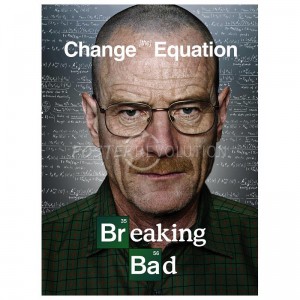Television, more than any other medium, allows its audience to experience a story over time. Characters grow and develop over the years and the audience shares in this. The big, life-changing moments happen, but so do the small ones, the day to day and week to week choices that shape who a person really is. Literature allows the audience into a character’s mind. Film immerses the audience in a world. Television lets the audience live with characters and even, in some cases, grow up alongside them. Most TV follows this model, but in the past decade or so, several series have broken away from it, choosing to tell highly time-sensitive, serialized stories that, rather than spanning roughly the same time period that the audience is experiencing, take place in a matter of months, weeks, or even hours.
Condensed time line series hit the mainstream in 2001 with the premiere of 24. It was a bold move for FOX- an action-drama series in real time with each episode running directly into the next. Though complex and demanding serialized shows had been hits before (Twin Peaks, for example), this took that idea to the extreme. Though 24 was a success, few series have tackled a similar format since. Three that did, or do, play with this concept are LOST, Breaking Bad, and True Blood. The first four seasons of LOST take place over the course of 101 days (after that it gets complicated). Breaking Bad and True Blood, though both are currently in their fourth seasons, had only covered 31 and just under 8 weeks, respectively, at the time of their current season premieres (and that’s with True Blood skipping two weeks between its first and second season). Each of these three series focus on intense, complicated, and high-pressure situations whose timeliness are of the utmost importance and each is a series that would be fundamentally different if it adopted a more standard time frame.
 Constricting a show’s time line can offer many advantages. Narrative possibilities that would otherwise be lost are able to be explored. In Breaking Bad, for example, the entire premise is centered around the main character’s diagnosis with terminal cancer. Narrowing down the time period covered in each episode, and each season, allows creator Vince Gilligan to get multiple seasons worth of material out of a timespan most other shows would cover in a matter of episodes or at most a year. This format also lends a sense of urgency to the events in a series. Characters don’t get a chance to breathe, let alone think; they are forced to respond and act upon new information, to make gut calls, often revealing much about their psyche as they do so. More than anything else, it can be argued that this structure allows writers and producers to skip the “boring” parts, to go from high point to high point without having to dwell in the aftermath. This is particularly true when series in this mode skip large chunks of time between seasons, as 24, LOST, and True Blood have each done.
Constricting a show’s time line can offer many advantages. Narrative possibilities that would otherwise be lost are able to be explored. In Breaking Bad, for example, the entire premise is centered around the main character’s diagnosis with terminal cancer. Narrowing down the time period covered in each episode, and each season, allows creator Vince Gilligan to get multiple seasons worth of material out of a timespan most other shows would cover in a matter of episodes or at most a year. This format also lends a sense of urgency to the events in a series. Characters don’t get a chance to breathe, let alone think; they are forced to respond and act upon new information, to make gut calls, often revealing much about their psyche as they do so. More than anything else, it can be argued that this structure allows writers and producers to skip the “boring” parts, to go from high point to high point without having to dwell in the aftermath. This is particularly true when series in this mode skip large chunks of time between seasons, as 24, LOST, and True Blood have each done.
As with anything, there are tradeoffs made when choosing to tell a story in this way. It’s easy for actors to age out of their roles. This became a big problem on LOST when Malcolm David Kelley had to be written out- his character, Walt, was supposed to be ten years old but after a year or so, Kelley hit a growth spurt and directors eventually ran out of ways to shoot around it.  Though condensing the timeline allows writers to examine characters in detail during particularly stressful situations, the ability to watch them grow and change over time is sacrificed. The life-changing moments are still there, but the gradual, daily choices that are more often the agents of change are lost. Even more troublesome is the disconnect that can arise between the world of the show and the audience. It’s easy for viewers to forget just how little time has passed in the reality of the show and to get frustrated when characters haven’t gotten over a particular event or made up their mind about a decision. The opposite can be problematic as well, with characters seeming to have forgotten at the end of the season something that in their timeline happened only a few hours, days, or weeks earlier. These issues can be avoided, but it takes a deft hand and lots of advance planning to do so, which in itself can end up stifling a series.
Though condensing the timeline allows writers to examine characters in detail during particularly stressful situations, the ability to watch them grow and change over time is sacrificed. The life-changing moments are still there, but the gradual, daily choices that are more often the agents of change are lost. Even more troublesome is the disconnect that can arise between the world of the show and the audience. It’s easy for viewers to forget just how little time has passed in the reality of the show and to get frustrated when characters haven’t gotten over a particular event or made up their mind about a decision. The opposite can be problematic as well, with characters seeming to have forgotten at the end of the season something that in their timeline happened only a few hours, days, or weeks earlier. These issues can be avoided, but it takes a deft hand and lots of advance planning to do so, which in itself can end up stifling a series.
The lines between film and television have been blurring for years. TV is no longer the ugly stepchild- actors often receive as much if not more acclaim for their work on the small screen than in a movie. For writers, it has long been the destination of choice, where they can have more control over their creation and shepherd it through the years. Perhaps the final element to change is the very nature of what makes TV unique- the time table, the sense that the characters and shows a viewer watches are of a similar world, sharing similar, if skewed or heightened, experiences and walking along with the audience through life. It will take time for this concept to become commonplace, but as more series experiment with their time frames and audiences become more accustomed to this, the rules and definitions of what television is will change and grow, perhaps creating a new genre all together.
Kate Kulzick
PS- I’m now on Twitter. Follow @theteleverse to hear about the TV I’m watching and to let me know what you’d like to see SoS TV cover.






